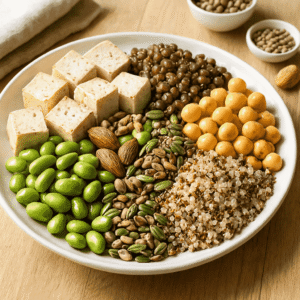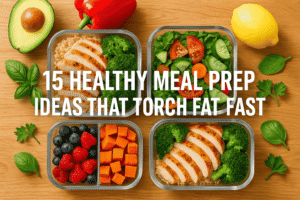Let’s be real — for most people, gaining weight sounds like a dream. But if you’re someone trying to pack on a few pounds, you already know it’s not all cupcakes and pizza. Gaining healthy weight — not just body fat — is a strategic game that demands smart eating, strength training, and a lot of patience.
Today, I’m breaking it all down: how you can gain weight fast and safely without feeling bloated, unhealthy, or just plain tired. Ready? Let’s dive right in!
Why Gaining Weight Can Be So Hard
Most fitness conversations revolve around losing weight. Rarely do people talk about how darn hard it is to gain weight. But trust me, it is! Some folks naturally have faster metabolisms, hyperactive lifestyles, or even genetic factors that make it harder for them to hold onto any extra calories.
If you’re one of those people who can eat two burgers and still see no change on the scale, don’t worry. You’re not alone — and there are ways to beat the system (naturally, of course).
What Does Healthy Weight Gain Actually Mean?
Let’s get something super clear: healthy weight gain doesn’t mean stuffing yourself with junk food just to tip the scale. Sure, you might gain weight by scarfing down pizzas and ice cream daily, but you’ll also invite along a whole list of health problems.
Healthy weight gain means building lean muscle, strengthening your bones, boosting your stamina, and keeping your heart healthy. Think of your body like a luxury car — you want to fill it with premium fuel, not garbage.
The Golden Rule: Calorie Surplus
The simple truth is, if you want to gain weight, you need to eat more calories than you burn. That’s your holy grail.
But, how much more? A good starting point is to add 300–500 extra calories per day if you want slow, steady weight gain. If you want to see faster results, bump that up to 700–1,000 extra calories daily.
Still, don’t just eat anything and everything. Choose smart, calorie-dense foods that nourish your body while helping you meet your goals.
Best Foods for Rapid and Safe Weight Gain
High-Protein Heroes
When gaining weight, protein becomes your best friend. Muscle is made of protein, and without enough of it, those extra calories are going straight to fat stores instead of building strength.
Here are some top-notch protein sources:
- Chicken breast (super versatile)
- Eggs (nature’s multivitamin)
- Salmon and fatty fish (also great for your brain)
- Full-fat dairy (milk, yogurt, cheese)
- Beef (choose lean cuts when possible)
- Whey protein shakes (super easy to add)
Powerful Carbs
Carbs are your energy buddies. Don’t fear them! They help shuttle nutrients to your muscles and replenish energy stores.
Add these healthy carbs into your meals:
- Brown rice
- Quinoa
- Sweet potatoes
- Oats
- Whole grain breads
- Fruits like bananas, apples, and mangoes
Fats Are Your Secret Weapon
Fats are calorie-dense — one gram has 9 calories (compared to 4 calories per gram of carbs or protein). That’s why healthy fats are absolute gold for people looking to gain weight.
Focus on these healthy fats:
- Avocados
- Olive oil
- Peanut butter
- Almonds, walnuts, cashews
- Seeds like chia and flaxseeds
You can drizzle olive oil on your meals, add nut butter to your smoothies, or just munch on a handful of trail mix between meals. Little things make a big difference!
Strategic Eating: How Often Should You Eat?
Instead of the traditional three meals a day, aim for five to six smaller meals spaced throughout the day. Eating every 2–3 hours ensures your body constantly has fuel to build muscle and gain weight.
A simple eating schedule might look like:
- Breakfast
- Snack
- Lunch
- Snack
- Dinner
- Post-dinner snack
You’re basically never letting your stomach stay empty!
Sample Daily Meal Plan for Weight Gain
Here’s what a high-calorie, muscle-building day could look like:
Breakfast:
Oatmeal made with whole milk, topped with banana slices, peanut butter, and a sprinkle of chia seeds.
Morning Snack:
Greek yogurt with a handful of walnuts and a drizzle of honey.
Lunch:
Grilled chicken breast, quinoa, avocado slices, and a side of roasted veggies with olive oil.
Afternoon Snack:
A smoothie made with whey protein, oats, peanut butter, frozen berries, and milk.
Dinner:
Salmon fillet, mashed sweet potatoes, steamed broccoli, and a buttered whole-grain roll.
Evening Snack:
Cottage cheese with pineapple chunks.
Boom — high calories, balanced nutrients, and real, clean food!
Strength Training Is Non-Negotiable
You can eat like a champion, but without proper workouts, much of the weight you gain could just be fat.
The secret sauce? Strength training.
Focus on compound exercises — moves that target multiple muscle groups at once. Think:
- Deadlifts
- Squats
- Bench presses
- Pull-ups
- Rows
Train at least 3–4 times a week, progressively lifting heavier weights over time. Challenge your muscles, break them down, and let your nutrition build them back stronger and bigger.
Supplements: Helpful, Not Essential
Supplements can help when you’re struggling to meet your calorie or protein goals through food alone.
But remember: they’re called supplements for a reason. They supplement your diet — they don’t replace it.
Useful supplements for weight gain:
- Whey protein powder (easy and convenient)
- Creatine monohydrate (supports strength and muscle gains)
- Mass gainers (for those with sky-high calorie needs)
Pro-tip: Always check the ingredients. Look for products with minimal artificial junk.
Common Mistakes When Trying to Gain Weight
- Skipping meals: Consistency beats intensity. Never miss a meal.
- Neglecting protein: Without enough protein, weight gain will mostly be fat.
- Relying on junk food: Long-term health is the goal, not just pounds.
- No workout plan: Muscle comes from lifting, not lounging.
- Lack of sleep: Growth happens when you’re resting, not when you’re awake!
How Long Will It Take to Gain Weight?
Realistically, expect noticeable changes within 1–2 months if you stay consistent.
Building true muscle mass is slow — it’s a marathon, not a sprint. But stick to the plan, and the results will speak for themselves.
Patience + Consistency + Smart Eating + Strength Training = Solid Gains!
Tips for People with Super Fast Metabolisms
If you feel like you’re burning calories just by breathing, here’s how to fight back:
- Drink your calories (smoothies, shakes, milk)
- Eat calorie-dense foods (nut butters, cheeses, oils)
- Snack strategically (never go more than 2–3 hours without eating)
- Focus on low-volume, high-calorie meals (instead of huge bulky salads)
Imagine building a fire — if you throw twigs on it every now and then, it burns bright. That’s how you need to feed your body!
Conclusion
Gaining weight isn’t about eating junk or lounging around — it’s a focused, strategic effort that demands smart choices and consistency. You need a plan that includes calorie-dense, nutrient-packed foods, proper strength training, supplements if needed, and patience.
It may seem slow at first, but trust the process. Keep showing up at every meal, every workout, and every good night’s sleep. A few months from now, you’ll be looking in the mirror thinking, “Dang, that’s what hard work looks like!”
Whether you’re building muscle for strength, sports, or just personal confidence, the journey starts today — one meal, one rep, and one step at a time.
FAQs
1. Is it possible to gain weight in a month?
Yes! With a calorie surplus, strength training, and consistent eating, you can expect to gain 2–4 pounds of healthy weight in a month.
2. What is the best drink for weight gain?
Milk, smoothies with whey protein and peanut butter, and homemade mass gain shakes are fantastic high-calorie drinks.
3. Should I eat before bed to gain weight?
Absolutely. A small, protein-rich snack like cottage cheese or a peanut butter sandwich can help with overnight muscle recovery and weight gain.
4. How much protein do I need daily to gain muscle?
Aim for 1.0–1.5 grams of protein per pound of body weight. So, if you weigh 150 pounds, you’ll want around 150–225 grams of protein daily.
5. Can skinny people gain weight without supplements?
Definitely! Supplements are just a tool. Real, whole foods can provide all the calories and nutrients you need — supplements are for convenience.




